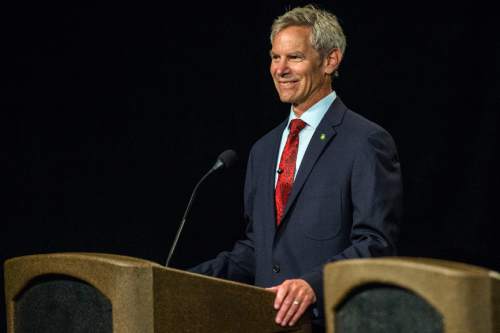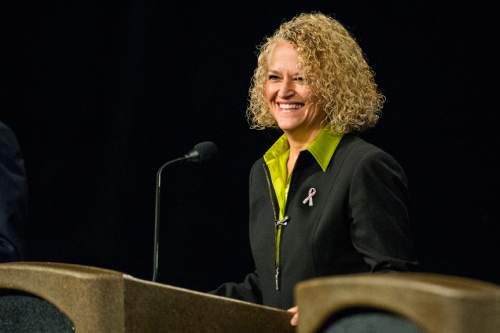This is an archived article that was published on sltrib.com in 2015, and information in the article may be outdated. It is provided only for personal research purposes and may not be reprinted.
With ballots already in Salt Lake City residents' mailboxes and one published poll indicating a tight race, the candidates for mayor have sharpened their elbows, going after each other with allegations of special-interest ties and flip-flopping.
Mayor Ralph Becker and challenger Jackie Biskupski actually agree on more issues than not, but in a KSL TV debate Wednesday, their differences stood out in such areas as sexual harassment policy and the canyon protection/development blueprint called Mountain Accord.
On Mountain Accord, the two-term incumbent accused Biskupski of flip-flopping by now supporting the agreement-in-concept.
"I appreciate in this last week that my opponent is now saying she appreciates Mountain Accord. It's the first time I've heard it, so she's switched her position on that," Becker said, giving a backhanded compliment that it's a good thing when people learn more about a topic and "adapt."
Biskupski denied that she has flipped.
"I was never opposed to Mountain Accord; I think the work that was done there is tremendous," Biskupski said.
She has previously criticized the notion that the agreement is by itself a solution to future development issues with the canyons, warning that it has elements that need to be thoroughly studied and managed. Foremost among those, she believes, are the potential of construction of a train up Little Cottonwood Canyon and a tunnel connecting Little and Big Cottonwood canyons.
Elected leaders need to be vigilant, she said: "We are not uncorking a disaster like we saw in Colorado this summer." She was referring to the release of 3 million gallons of contaminated mine waste into the Animas River.
Biskupski, for her part, jabbed Becker for what she said was fumbling sexual harassment claims by city employees, starting with the substantiated complaints of three female police officers and the forced resignation of Police Chief Chris Burbank a year later.
Becker pushed back, saying Burbank's mishandling of the case and his failure to correct course was the reason he was forced out.
"Sexual harassment is such an incredibly important matter, and since I've been in office, we have overhauled not only our sexual-harassment policies, but how we handle them," Becker said. "Sexual harassment is never acceptable."
Biskupski counterpunched, pointing to current sexual discrimination/harassment claims filed by a city employee against Fire Chief Brian Dale, whom the mayor appointed last May.
"For the mayor to say that he takes sexual harassment seriously is a concern to me because it was just a week after the whole Burbank thing came down that he appointed the new chief in the fire department," Biskupski said. "If it is not something you tolerate, I think promoting someone during this process is a huge mistake and sends a different message, not only to the woman who filed the complaint, but to all the people who work at the city."
The mayor defended his actions and said he has gone to great lengths to assure appropriate review and a fair process.
"When Chief Dale was appointed, there were rumors of some sexual harassment claims against him," Becker said. Those allegations were independently reviewed by the administration, and all information was shared with the City Council for consideration before members confirmed the appointment.
"Since that time, a formal complaint has been filed, it's under investigation and I'm looking forward to seeing how that unfolds and making sure it's handled properly and justice is done," Becker said.
On the issue of campaign-finance reform, both agreed that the city needs to tighten laws to try to minimize special-interest money in campaigns. But both pointed fingers at each other for their supporters.
Becker pointed to a flood of billboards, most of them supporting Biskupski and all of them targeting Becker, as exhibit A in the argument against big money in city races. Biskupski said the mayor has taken donations from city contractors — practice prohibited in Salt Lake County campaigns.
"For the first time this year, working parallel at least with my opponent, Reagan billboards said, 'you know what, we're going to go past all those contribution limits and as they put it, we're going to put well over $100,000 into an individual effort to try to remove [Becker] from office.' "
Becker identified billboard companies as a top political enemy because of his views on outdoor advertising.
"I believe that billboards not only don't add to our city, but as a special interest and in the way Reagan Billboards in particular has a pay-to-play type of approach, that that kind of special interests we should take out of politics and make decisions based on the broad public interest," Becker said.
Biskupski denied asking for help from the billboard company or coordinating their advertising and accused Becker of "trying to taint my character."
She then accused him of taking campaign donations from city contractors.
"The mayor is taking money from those people who have contracts with our city right now. And I think that's a pay-to-play thing that should not be happening," Biskupski said. "It's not allowed at the [Salt Lake] county," she said, referring to a county ordinance that prohibits a county contractor donating more than $100 to any candidate for county office.
The candidates will meet in a debate sponsored by The Salt Lake Tribune on Oct. 28 at 7 p.m. in the Salt Lake City Library. Election Day is Nov. 3 and all by-mail ballots must be hand delivered by then or postmarked by Nov. 2.





